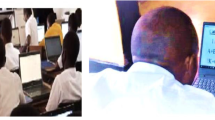Abstract
This study explored the efficacy of promoting a beginning chemistry teacher's curriculum development and teaching practices through the use of computers. Using pictorial analogies, historical cases of science, and discrepant events in a web site designed by the researchers as curricular samples, the beginning teacher was asked to develop similar curriculum for his own teaching. After taking the researchers' advice into account and making adjustments, the beginning teacher implemented the curriculum in his classroom teaching and shared his experience with the researchers by e-mail communications. The teacher's teaching practices both before and after the web site treatment were observed and analyzed. It was found that before the treatment the teacher used the textbook as the only resource of his teaching. Extra curriculum was rarely seen, there were not many student-teacher interactions, and analogies or examples used in his explanation of abstract concepts were not preorganized. On the other hand, after the treatment, the teacher was able to develop suitable curricula by himself for the purpose of increasing student involvement. He also explained the applications of chemical concepts in daily lives and his analogies and demonstrations were well organized. Although the beginning teacher was able to develop curricula after the treatment, many aspects of his teaching can be improved, especially in the areas of student-teacher interaction and the implementation of students activities in science teaching.
Similar content being viewed by others
REFERENCES
Brickhouse, N., and Bodner, G. M. (1992). The Beginning science teacher: Classroom narratives of convictions and constraints. Journal of Research in Science Teaching 29: 471–485.
Carin, A. A., and Sund, R. B. (1989). Teaching Modern Science, Merrill, Columbus.
Golden, R., and Sneider, C (1989). The greenhouse effect in a vial. The Science Teacher 57: 57–59.
Goodman, J. (1987). Key factors in becoming (or not becoming) an empowered elementary school teacher: A preliminary study of selected novices. Paper presented at the annual meeting of the American Educational Research Association, Washington, DC.
Harrison, A. G., and Treagust, D. F. (1993). Teaching with analogies: A case study in grade 10 optics. Journal of Research in Science Teaching 30: 1291–1307.
Karplus, R (1980). Two-year community college chemistry: Joules. An Application of Piaget's theory of cognitive development in teaching chemistry. The learning cycle. Journal of Chemical Education 57: 135–136.
Kumar, D., and Wilson, C. L. (1997). Computer technology, science education, and students with learning disabilities. Journal of Science Education and Technology 6: 155–160.
Lantz, D., and Kass, H. (1987). Chemistry Teachers' Functional Paradigms. Science Education 71: 117–134.
Lin, H. (1998). The effectiveness of teaching chemistry through the history of science. Journal of Chemical Education 75: 1326–1330.
Lin, H., Shiau, B., and Lawrenz, F. (1996). The effectiveness of teaching science with pictorial analogies. Research in Science Education 26: 495–511.
Linn, M. C. (1992). Science education reform: Building on the research base. Journal of Research in Science Teaching 29: 821–840.
Linn, M. C., and Muilenbury, L. (1996). Greeting lifelong science learners: What models form a firm foundation? Educational Researcher 25: 18–24.
Parke, H. M., and Coble, C. R. (1997). Teachers designing curriculum as professional development: A Model for transformational science teacher. Journal of Research in Science Teaching 34: 772–789.
Powell, R. (1997). Teaching alike: A cross-case analysis of first-career and second-career beginning teachers' instruction coverage. Teaching and Teacher Education 13: 341–356.
Rowe, M. B. (1987). Wait time: Slowing down may be a way of speeding up. American Educator 11: 38–47.
Schwartz, J. L. (1997). What Happened to the Voice of the Author. Journal of Science Education and Technology 6: 83–90.
Tobin, K., and Fraser, B. J. (1990). What does it mean to be an exemplary science teacher?. Journal of Research in Science Teaching 27: 3–25.
Trowbridge, L. W., and Bybee, R. W. (1986). Becoming a Secondary School Science Teacher. Merrill, Columbus.
Yager, R. E. (1992). Viewpoint: What we did not learn from the 60s about science curriculum reform. Journal of Research in Science Teaching 29: 905–910.
Author information
Authors and Affiliations
Rights and permissions
About this article
Cite this article
Lin, Hs., Chiu, HL. Using Computers to Support a Beginning Teacher's Professional Development. Journal of Science Education and Technology 9, 367–373 (2000). https://doi.org/10.1023/A:1009488627194
Issue Date:
DOI: https://doi.org/10.1023/A:1009488627194




